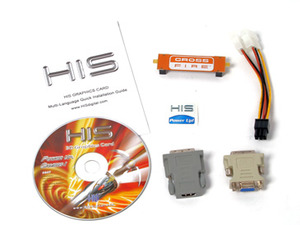HIS ATI Radeon HD 4870 1GB IceQ4+ Turbo
Manufacturer: HISUK Price (as reviewed): £229.00 (inc. VAT) - expected
US Price (as reviewed): $291.99 (ex. Tax)
Core Clock: 770MHz
Memory Clock: 4,000MHz
Memory: 1GB GDDR5
Warranty: Three years (parts and labour)
When AMD released the ATI Radeon HD 4870 1GB, it was the first time in a long time where we've actually seen the larger frame buffer size make a real difference in games. The original Radeon HD 4870 was a fantastic product and the 1GB version was arguably even better – the increased price was well worth swallowing in order to pocket the sometimes significantly enhanced gameplay experience.
We've already seen Gainward's take on the 4870 1GB and found that although there were some great ideas, there were also some flaws to the design as well. The biggest was the selection of outputs as DisplayPort's adoption is still questionable and we really don't see the need for a dedicated VGA port on a high-end graphics card in this day and age.
Today, we've got the HIS Radeon HD 4870 1GB IceQ4+ Turbo on the test bench – a card that doesn't stray too far away from the AMD reference design, but does come with a modest factory overclock and a modified cooling solution. So, let's get on with the grilling...
The card's aesthetics will be familiar to anyone who has seen any of HIS's recent graphics cards – there's the blue PCB, the UV coated heatsink shroud and the gold plated 'HD Concept' DVI connectors coupled with an anodised PCI mounting bracket. We've shared our scepticism about the theory behind the HD Concept in the past, so we won't go over it again – in simple terms, we don't see it as anything more than marketing.
At first, the heatsink design looked quite a bit different to the Radeon HD 4870's reference cooler, but upon closer inspection we realised that it's actually very similar. What HIS appears to have done is change the shroud on the heatsink – the two heatpipes are now exposed. In addition, the aluminium block that cools the memory has been modified (there's a screwhole next to the CrossFire connector where the missing part attaches) and the fan has been swapped out for a different one. Aside from that, the cooling solution appears to be relatively unchanged.
With this in mind, it's worth considering that the fan does get noisy when the card is under load – this was a bit of a disappointment for us because we're used to the HIS ICeQ-series graphics cards being exceedingly quiet. Being a little noisy under load doesn't concern us though, since most of the time that's going to mean you're playing games with headphones or speakers anyway. When the card is idling, it's barely audible above background system noise and shouldn't be a cause for concern.
Underneath the heatsink, there aren't any notable changes to the PCB design, but HIS has increased the card's default clock speeds. The GPU core frequency has been increased from 750MHz to 770MHz (2.6 percent), while the memory is overclocked from 3,600MHz to 4,000MHz effective (11.1 percent) – the former probably won't make much difference, but the latter should help at high resolutions and/or with high levels of anti-aliasing enabled.
The bundle is unsurprisingly lacklustre and about what we've come to expect from HIS, but just about everything you'll need to get the card running is included. There's a DVI-to-HDMI dongle, a DVI-to-VGA converter, a six-pin PCI-Express supplementary power adapter and a CrossFire connector. In addition, HIS includes a driver/utility CD, a paper manual and a case sticker – there are no cables for the HDTV out connector located in between the two dual-link DVI connectors.
Warranty:
HIS offers a three year limited warranty on all of its products that covers parts and labour. During the first year, this warranty is held with the retailer where you purchased the card and the remaining two years are handled by the manufacturer.One thing that is definitely noteworthy is the fact that the warranty doesn’t start when you purchase the card, instead it starts from the day when the card was manufactured – that’s not ideal if the card is going to sit in a warehouse for six months. Despite that though, a good thing with HIS’s warranty terms is that you’re able to transfer this warranty should you choose to sell the card at a later date – this should sweeten the deal a little bit even if you’re put off by when the warranty term starts.

MSI MPG Velox 100R Chassis Review
October 14 2021 | 15:04















Want to comment? Please log in.